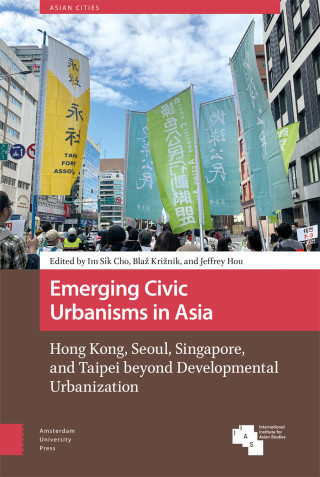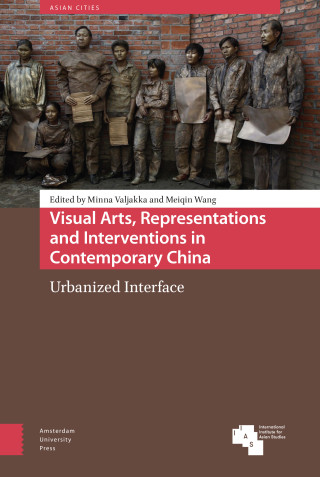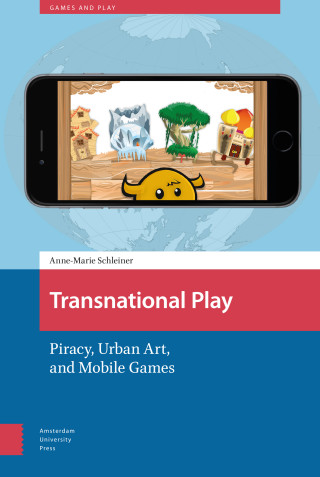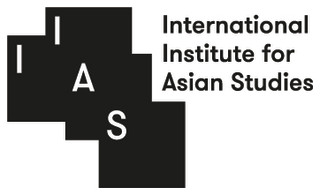
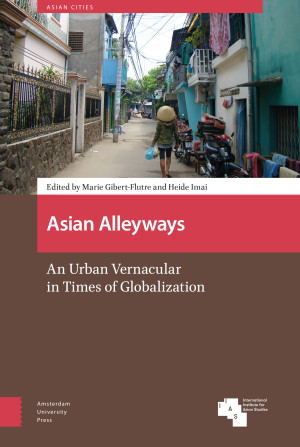
- Titel
- Asian Alleyways
- Subtitel
- An Urban Vernacular in Times of Globalization
- Redacteuren
- Marie Gibert-Flutre
- Heide Imai
- Prijs
- € 122,00 excl. BTW
- ISBN
- 9789463729604
- Uitvoering
- Hardback
- Aantal pagina's
- 228
- Taal
- Engels
- Publicatiedatum
- 01 - 11 - 2020
- Afmetingen
- 15.6 x 23.4 cm
- Serie
- Asian Cities
- Partner

- Discipline
- Aziëstudies
- Voorbeeld
- Download introductie
- Ook beschikbaar als
- eBook PDF - € 121,99
Acknowledgements
Asian alleyways: An urban vernacular in times of globalization (Marie GIBERT-FLUTRE and Heide IMAI)
CHAPTER 1 Between 'network' and 'territory': Ho Chi Minh City's alleyways as challenged liminal spaces (Marie GIBERT-FLUTRE)
CHAPTER 2 Street-corner society and everyday politics in the Beijing hutong: Ethnographic perspectives (Judith AUDIN)
CHAPTER 3 Alleyways between urban renewal, cultural innovation, and social integration: The cases of Tokyo and Seoul (Heide IMAI)
CHAPTER 4 The transformation of 'urban ordinaries' into creative places: A case study of Bangkok's alleyway neighbourhoods (Wimonrart ISSARATHUMNOON)
CHAPTER 5 Shanghai lilong: From everyday life to conceived space (Jiayu DING and Xiaohua ZHONG)
CHAPTER 6 From conflicts to commoning: Alleyways as sites for social innovations in Taipei (Jeffrey HOU)
CHAPTER 7 Magic Lanes: A placemaking approach for laneway spaces in Hong Kong (Melissa CATE CHRIST and Hendrik TIEBEN)
The future of Asian alleyways: Towards integrated and diverse alleyways (Heide IMAI and Marie GIBERT-FLUTRE)
Index
Asian alleyways: An urban vernacular in times of globalization (Marie GIBERT-FLUTRE and Heide IMAI)
CHAPTER 1 Between 'network' and 'territory': Ho Chi Minh City's alleyways as challenged liminal spaces (Marie GIBERT-FLUTRE)
CHAPTER 2 Street-corner society and everyday politics in the Beijing hutong: Ethnographic perspectives (Judith AUDIN)
CHAPTER 3 Alleyways between urban renewal, cultural innovation, and social integration: The cases of Tokyo and Seoul (Heide IMAI)
CHAPTER 4 The transformation of 'urban ordinaries' into creative places: A case study of Bangkok's alleyway neighbourhoods (Wimonrart ISSARATHUMNOON)
CHAPTER 5 Shanghai lilong: From everyday life to conceived space (Jiayu DING and Xiaohua ZHONG)
CHAPTER 6 From conflicts to commoning: Alleyways as sites for social innovations in Taipei (Jeffrey HOU)
CHAPTER 7 Magic Lanes: A placemaking approach for laneway spaces in Hong Kong (Melissa CATE CHRIST and Hendrik TIEBEN)
The future of Asian alleyways: Towards integrated and diverse alleyways (Heide IMAI and Marie GIBERT-FLUTRE)
Index
Recensies en Artikelen
"The rich ethnographic data provide insights into how to address the central question posed in the book, which asks what the future roles and functions of the old alleyways are in the modern city. Each chapter elucidates the potential of alleyways by examining their transformations and functions, explaining the conflicts and initiatives, and underlining concerns and uncertainties. Together, they develop new perspectives on the laneways through the concepts of marginalization and reintegration. [...] Asian Alleyways opens up questions that will interest architects, urban planners and designers, as well as policymakers interested in the spatial qualities and dynamics of these alleyways."
- Ha Minh Hai Thai, School of Architecture and Urban Design, RMIT University, Melbourne, Journal of Urban Design, 2021
"Within the mainstream study of cities, East Asian and everyday ordinary spaces, forms of long vernacular traditions, remain less-known urbanity. Asian Alleyways contributes to this field within cross-cultural dialogue and lenses of ubiquitous semi public-semi private urban spaces. Focusing on the Other, which escapes the globalisation and current verticalization processes, where intimate scale, a vibrant urban life and dwelling defines alternative urban spaces the book takes a case study approach to diverse human scale emergent urbanism. The book is an engaging review of East Asian alleyways that instigates discussion beyond nostalgia, exploring possibilities qualities and relevance of local processes of ordinary urban landscapes and contributes to broadening theoretical questions."
- Milica MuminoviC, PhD, Lecturer, Architecture, Faculty of Arts and Design, University of Canberra
"Asian Alleyways make an important contribution to Urban Studies at two levels. At the micro and local scale, alleyways exist as extensions of the home, and are intimate spaces of the self and the community of users. The informality and intimacy enable such spaces to be creatively managed resulting in dynamic mixes of different uses. At the metropolitan scale, alleys and lanes as traditional spatial forms have an uneasy existence in the modern city. The different chapters of Asian Alleyways highlight the important local textures that go into the making of city character and yet alleywaysare under threat from redevelopment and gentrification as Asian cities undergo rapid change."
- K.C. Ho, Associate Professor of Sociology and Research Leader, Asian Urbanisms, Asia Research Institute, National University of Singapore.
"This dynamic collection brings to life the hidden veins of contemporary urbanity by focusing on an array of alleyways across different cities in Asia. In interweaving colourful sensory aspects of these passages with both granular insights and broad structural critique, Gibert-Flutre and Imai have assembled a multidisciplinary arsenal of chapters that opportunely punctuate and challenge state-of-the-art debates on urbanization in the region and beyond. A must-read and a valuable resource for researchers and students of urban studies, sustainability and everyday life."
- Dr Kelvin E.Y. Low, Associate Professor/ Deputy Head Of Department, Department Of Sociology, Faculty of Arts and Social Sciences National University of Singapore
- Ha Minh Hai Thai, School of Architecture and Urban Design, RMIT University, Melbourne, Journal of Urban Design, 2021
"Within the mainstream study of cities, East Asian and everyday ordinary spaces, forms of long vernacular traditions, remain less-known urbanity. Asian Alleyways contributes to this field within cross-cultural dialogue and lenses of ubiquitous semi public-semi private urban spaces. Focusing on the Other, which escapes the globalisation and current verticalization processes, where intimate scale, a vibrant urban life and dwelling defines alternative urban spaces the book takes a case study approach to diverse human scale emergent urbanism. The book is an engaging review of East Asian alleyways that instigates discussion beyond nostalgia, exploring possibilities qualities and relevance of local processes of ordinary urban landscapes and contributes to broadening theoretical questions."
- Milica MuminoviC, PhD, Lecturer, Architecture, Faculty of Arts and Design, University of Canberra
"Asian Alleyways make an important contribution to Urban Studies at two levels. At the micro and local scale, alleyways exist as extensions of the home, and are intimate spaces of the self and the community of users. The informality and intimacy enable such spaces to be creatively managed resulting in dynamic mixes of different uses. At the metropolitan scale, alleys and lanes as traditional spatial forms have an uneasy existence in the modern city. The different chapters of Asian Alleyways highlight the important local textures that go into the making of city character and yet alleywaysare under threat from redevelopment and gentrification as Asian cities undergo rapid change."
- K.C. Ho, Associate Professor of Sociology and Research Leader, Asian Urbanisms, Asia Research Institute, National University of Singapore.
"This dynamic collection brings to life the hidden veins of contemporary urbanity by focusing on an array of alleyways across different cities in Asia. In interweaving colourful sensory aspects of these passages with both granular insights and broad structural critique, Gibert-Flutre and Imai have assembled a multidisciplinary arsenal of chapters that opportunely punctuate and challenge state-of-the-art debates on urbanization in the region and beyond. A must-read and a valuable resource for researchers and students of urban studies, sustainability and everyday life."
- Dr Kelvin E.Y. Low, Associate Professor/ Deputy Head Of Department, Department Of Sociology, Faculty of Arts and Social Sciences National University of Singapore
Marie Gibert-Flutre, Heide Imai (red.)
Asian Alleyways
An Urban Vernacular in Times of Globalization
De onderstaande tekst is niet beschikbaar in het Nederlands en wordt in het Engels weergegeven.
Asian Alleyways: An Urban Vernacular in Times of Globalization critically explores "Global Asia" and the metropolization process, specifically from its alleyways, which are understood as ordinary neighbourhood landscapes providing the setting for everyday urban life and place-based identities being shaped by varied everyday practices, collective experiences and forces. Beyond the mainstream, standardising vision of the metropolization process, Asian Alleyways offers a nuanced overview of urban production in Asia at a time of great changes, and will be welcomed by an array of scholars, students, and all those interested in the modern transformation of Asian cities and their urban cultures.
Redacteuren
Marie Gibert-Flutre
Dr. Marie Gibert-Flutre is Assistant Professor of Geography in the Department of East Asia Studies (LCAO) at the University of Paris.
Heide Imai
Dr. Heide Imai is Associate Professor at Senshu University, Faculty of Intercultural Communication, Tokyo, Japan.

